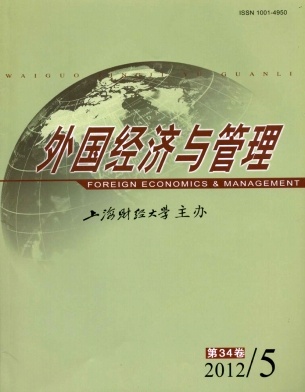新产品开发项目复杂性权变管理策略研究与展望——基于选择法与学习法
外国经济与管理 2012 年 第 34 卷第 05 期, 页码:59 - 66
摘要
参考文献
摘要
本文首先基于选择法和学习法,提出了六种能够有效应对新产品开发项目复杂性的管理策略,然后基于适应度景观理论,分析了管理策略影响项目成功的三个中介变量,并根据对象和来源两个维度将新产品开发项目复杂性划分为四种类型而将其作为管理策略与中介变量之间的调节变量,最后探讨了管理策略与中介变量的关系及项目复杂性的调节作用,构建了管理策略对新产品开发项目成功的影响机制模型。
[1]Fang C,et al.Balancing exploration and exploitation through structural design:The isolation of subgroups and organization-al learning[J].Organization Science,2010,21(3):625-642.
[2]Gavetti G.Cognition and hierarchy:Rethinking the microfoun-dations of capabilities’development[J].Organizational Science,2005,16(6):599-617.
[3]Girotra K,et al.Valuing R&D projects in a portfolio:Evidence from the pharmaceutical industry[J].Management Science,2007,53(9):1452-1466.
[4]Iansiti M.Technology integration:Managing technological evolution in a complex environment[J].Research Policy,1995,24(4):521-542.
[5]Kauffman S A,et al.Optimal search on a technology landscape[J].Journal of Economic Behavior and Organization,2000,43(2):141-166.
[6]Loch C H,et al.Managing the unknown:A new approach to managing high uncertainty and risk in projects[M].New York:John Wiley,2006.
[7]Loch C H,et al.Diagnosing unforeseeable uncertainty in a new venture[J].Journal of Product Innovation Management,2008,25(1):28-46.
[8]March J G.Exploration and exploitation in organizational learning[J].Organization Science,1991,2(1):71-87.
[9]McGrath R G.Exploratory learning,innovative capacity,and managerial oversight[J].Academy of Management Journal,2001,44(1):118-131.
[10]O’Reilly C A and Tushman M L.The ambidextrous organi-zation[J].Harvard Business Review,2004,82(4):74-81.
[11]Pich M T,et al.On uncertainty,ambiguity and complexity in project management[J].Management Science,2002,48(8):1008-1023.
[12]Saynisch M.Beyond frontiers of traditional project manage-ment:An approach to evolutionary,self-organizational princi-ples and the complexity theory-results of the research pro-gram[J].Project Management Journal,2010,41(2):21-37.
[13]Siggelkow N and Rivkin J W.Speed and search:Designing or-ganizations for turbulence and complexity[J].Organization Science,2005,16(2):101-122.
[14]Sommer S C,et al.Managing complexity and unforeseeable uncertainty in startup companies:An empirical study[J].Or-ganization Science,2009,20(1):118-133.
[15]Sommer S C and Loch C H.Selectionism and learning in pro-jects with complexity and unforeseeable uncertainty[J].Man-agement Science,2004,50(10):1334-1347.
[16]Vidal L A and Marle F.Understanding project complexity:Implications on project management[J].Kybernetes,2008,37(8):1094-1110.
[17]Williams T M.The need for new paradigms for complex pro-jects[J].International Journal of Project Management,1999,17(5):269-273.
[18]陈劲等.R&D项目的中止决策[J].科学学与科学技术管理,2003,(8):5-8.
[19]董静等.基于不确定性和复杂性的创新项目管理模式研究[J].科研管理,2006,(3):103-109.
[20]吕鸿江等.组织复杂性管理理论探析[J].科学学与科学技术管理,2009,(1):35-43.
[2]Gavetti G.Cognition and hierarchy:Rethinking the microfoun-dations of capabilities’development[J].Organizational Science,2005,16(6):599-617.
[3]Girotra K,et al.Valuing R&D projects in a portfolio:Evidence from the pharmaceutical industry[J].Management Science,2007,53(9):1452-1466.
[4]Iansiti M.Technology integration:Managing technological evolution in a complex environment[J].Research Policy,1995,24(4):521-542.
[5]Kauffman S A,et al.Optimal search on a technology landscape[J].Journal of Economic Behavior and Organization,2000,43(2):141-166.
[6]Loch C H,et al.Managing the unknown:A new approach to managing high uncertainty and risk in projects[M].New York:John Wiley,2006.
[7]Loch C H,et al.Diagnosing unforeseeable uncertainty in a new venture[J].Journal of Product Innovation Management,2008,25(1):28-46.
[8]March J G.Exploration and exploitation in organizational learning[J].Organization Science,1991,2(1):71-87.
[9]McGrath R G.Exploratory learning,innovative capacity,and managerial oversight[J].Academy of Management Journal,2001,44(1):118-131.
[10]O’Reilly C A and Tushman M L.The ambidextrous organi-zation[J].Harvard Business Review,2004,82(4):74-81.
[11]Pich M T,et al.On uncertainty,ambiguity and complexity in project management[J].Management Science,2002,48(8):1008-1023.
[12]Saynisch M.Beyond frontiers of traditional project manage-ment:An approach to evolutionary,self-organizational princi-ples and the complexity theory-results of the research pro-gram[J].Project Management Journal,2010,41(2):21-37.
[13]Siggelkow N and Rivkin J W.Speed and search:Designing or-ganizations for turbulence and complexity[J].Organization Science,2005,16(2):101-122.
[14]Sommer S C,et al.Managing complexity and unforeseeable uncertainty in startup companies:An empirical study[J].Or-ganization Science,2009,20(1):118-133.
[15]Sommer S C and Loch C H.Selectionism and learning in pro-jects with complexity and unforeseeable uncertainty[J].Man-agement Science,2004,50(10):1334-1347.
[16]Vidal L A and Marle F.Understanding project complexity:Implications on project management[J].Kybernetes,2008,37(8):1094-1110.
[17]Williams T M.The need for new paradigms for complex pro-jects[J].International Journal of Project Management,1999,17(5):269-273.
[18]陈劲等.R&D项目的中止决策[J].科学学与科学技术管理,2003,(8):5-8.
[19]董静等.基于不确定性和复杂性的创新项目管理模式研究[J].科研管理,2006,(3):103-109.
[20]吕鸿江等.组织复杂性管理理论探析[J].科学学与科学技术管理,2009,(1):35-43.
引用本文
刘效广, 杨乃定, 郭晓. 新产品开发项目复杂性权变管理策略研究与展望——基于选择法与学习法[J]. 外国经济与管理, 2012, 34(5): 59–66.
导出参考文献,格式为:
上一篇:开放式创新实证研究述评与未来展望





 6396
6396  358
358

